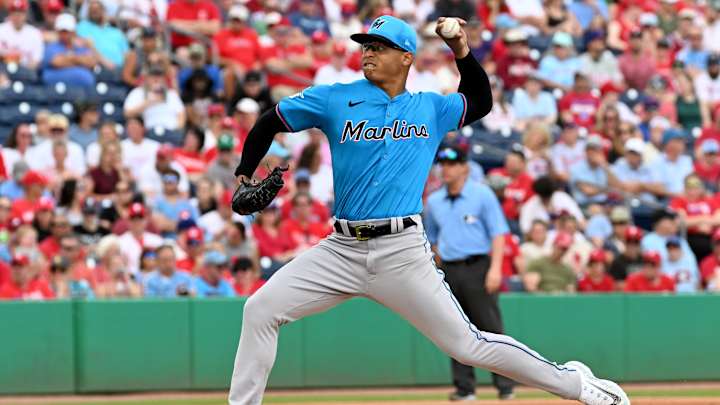National Baseball Writer Calculates Contract Extension Price for Two Miami Stars

The Miami Marlins have several players that they should consider locking up to long-term deals.
Because it's just going to get more expensive from here.
National baseball writer Tim Britton of The Athletic spent this week calculating 50 potential extensions for major leaguers, ranging from last season's rookies to pending free agents. Included in those articles were both Marlins pitcher Jesús Luzardo and second baseman Luis Arráez.
And this isn't just a guess; Britton consulted 900 free-agent and extension contracts, cross-referencing them with statistical production leading up to and in platform years to calculate what a player might receive from their team when signing a pre-free agency deal.
How much to pay Jesús Luzardo?
In his "pitchers in arbitration" article, Britton dove into Luzardo's statistical performance and weighted it towards his most recent work, eventually coming up with a familiar comparison: former Marlins pitcher Pablo López, since traded to the Minnesota Twins.
Lopez signed a four-year, $73.5M contract with the Twins in April of last season, just months after being traded from Miami to Minnesota along with two prospects for Luis Arráez.
Using that comparison, Britton estimated Luzardo's market-rate deal would come out to six years and $90M, an Average Annual Value (AAV) of $15M per season.
In a follow-up article on the timing of these deals, published on Friday, Britton put the potential deal into his Tier 3, called "makes more sense for the team." the argument here was about the potential for a big 2023 season from Luzardo making the deal "easily cross into nine figures."
How much to pay Luis Arráez?
Arráez feels like a tougher deal to figure out - he's somewhat of a one-trick pony, but he's potentially the best in the league at that trick.
Britton eventually settled on a comparison to Arizona Diamondbacks infielder Ketel Marte, combining a projected $15M arbitration award for 2024 with $20M per season valuations under the new deal to reach five years and $85M, an $17M AAV.
In the follow-up article about the timing of the deals, Arráez fell into the "makes more sense for the player" section, with Britton making the argument that this specific skill set - batting average - isn't always valued properly or rewarded commensurately in free agency.
The two articles calculating the values of the extension (Luzardo, Arráez) and the follow-up article about the timing of the deals are available for subscribers of The Athletic.
